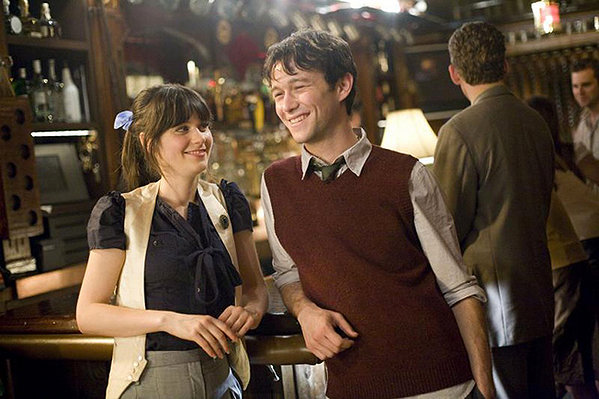(500) Days of Summer could be classified as a romantic comedy. It could also be called a drama, maybe even a tragedy. It’s definitely a story of boy-meets-girl. And it is not, as we are told upfront, a love story.
We know from the beginning that things don’t work out between Tom (Joseph Gordon-Levitt), our hopelessly romantic protagonist, and Summer (Zooey Deschanel), the mysterious Manic Pixie Dream Girl-type he sets his sights on. The film’s title is a reference to the 500 days that Summer is in Tom’s life--but we don’t start at Day 1. In fact, we begin on Day 488, and then jump back to Day 290. Why? Because that is how Tom--and most people, really--remember things, especially something as tumultuous, exciting and baffling as his relationship with Summer. The film is very conscious of the ways in which people think and remember--resulting in its highly unusual but perfectly executed structure. These jumps in time are executed seamlessly, and somehow never manage to make less than perfect sense.
Ever since childhood, Tom has been convinced that he’ll never be truly happy until he finds “the one.” Summer, on the other hand, doesn’t believe in love as a result of her parents’ divorce. Tom knows from the beginning that Summer isn’t looking for anything serious, but that doesn’t stop him from pursuing her, endlessly hoping he can convince her to change her mind because he believes they are soul mates. As I watched, I almost forgot that I already knew how things would end up between the two of them, and I began hoping alongside Tom. But what is so unusual--and brilliant--about this film is its refusal to play by the rules. Summer never caves, and the two don’t live happily ever after. We have come to expect a certain reassurance from Hollywood movies--that there are true romances and happy endings out there. That’s not what we’re given here, though. Instead, we get reality.
This is one of those movies that warrant repeated viewings, with different ideas and questions being raised each time. Yes, Summer breaks Tom’s heart, but whose fault is it really? She never lied to Tom, and told him from the beginning she didn’t want a serious relationship. Was Tom in love with Summer, or the idea of being in love? In one scene, as Tom attends a party at Summer’s house, the film employs a split screen that shows Tom’s expectations versus reality. Needless to say, the two don’t quite match up. This makes me wonder: since Tom has been perfecting and reimagining this fantasy his entire life, is Summer just the final missing piece of the puzzle? Would any pretty girl that “likes the same bizarro crap he does” (as Tom’s younger sister puts it) do? And as a glimmer of hope shines for Tom at the film’s end, we are left wondering: has he learned his lesson as he is given a second chance at real love, or is he bound to make the same mistakes all over again? One line in particular, I think, encompasses the film’s main theme: when asked if his longtime girlfriend is really the girl of his dreams, Tom’s best friend replies, “She’s better than the girl of my dreams. She’s real.” If only Tom had such a mindset, he might fare better in love.
This is a movie that, rather than merely show us what happens, tells us upfront how it ends and then explores the how and why. Thought-provoking, perfectly cast, and brilliantly written, (500) Days of Summer is consistently honest, funny, and unique, making it one of the best films of 2009.

 RSS Feed
RSS Feed
